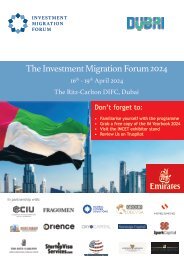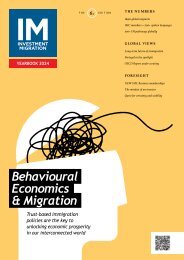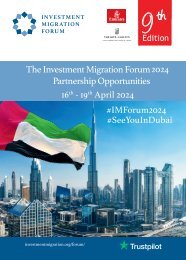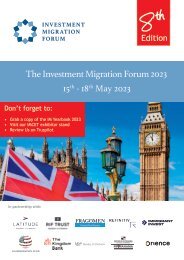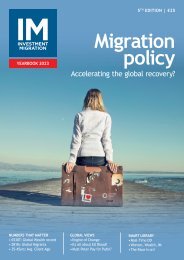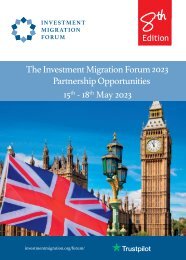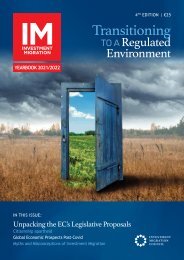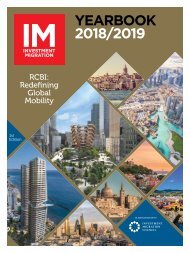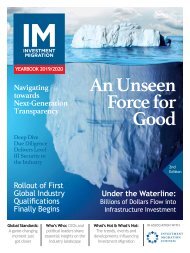IM Yearbook 2020/21
Born from the need for a global, credible, “go-to” publication, the 3rd IM Yearbook offers valuable access to a prime target audience of top industry influencers, decision makers, and the foremost referral network to the world’s most influential Investment Migration programmes: Government officials such as Heads of CIU’s, policy makers, academics, migration agents, law firms, wealth managers, financial advisors, real estate developers, and international firms involved in investment migration.
Born from the need for a global, credible, “go-to” publication, the 3rd IM Yearbook offers valuable access to a prime target audience of top industry influencers, decision makers, and the foremost referral network to the world’s most influential Investment Migration programmes: Government officials such as Heads of CIU’s, policy makers, academics, migration agents, law firms, wealth managers, financial advisors, real estate developers, and international firms involved in investment migration.
Create successful ePaper yourself
Turn your PDF publications into a flip-book with our unique Google optimized e-Paper software.
The Middle East<br />
Turkey’s citizenship-by-investment<br />
programme continues to attract<br />
applicants. According to media reports,<br />
the country has granted more than<br />
9,000 citizenship through real estate<br />
investment since 2016. However, the<br />
lion’s share of applications was received<br />
after the country reduced the investment<br />
threshold in 2018. Since then foreigners<br />
who purchase real estate in Turkey<br />
worth a minimum of $250,000, instead<br />
of the previous limit of $1 million, qualify<br />
for Turkish citizenship. In addition to its<br />
attraction as a regional economic hub,<br />
many investors chose to first invest<br />
in a Turkish passport and then apply<br />
for the USA’s E2 entrepreneur visa<br />
through their new Turkish citizenship.<br />
Jordan aims to attract more investors to<br />
its citizenship-by-investment programme<br />
and reduced its minimum investment<br />
requirements by 25-50% depending<br />
on the investment option in <strong>2020</strong>. The<br />
programme, which started in 2018, has<br />
reportedly raised some $1.38 billion and<br />
created some 7,400 jobs from just 200<br />
investors. Meanwhile, Egypt’s cabinet<br />
also signed off on granting citizenship<br />
to foreigners who either buy property<br />
or invest in the country. Under the new<br />
law, foreigners have three ways to obtain<br />
Egypt passport: They can either donate<br />
$250,000 to the state treasury, purchase<br />
real estate of at least $500,000, or<br />
deposit at least $750,000 into a local bank<br />
account, which is returned after five years.<br />
Australia & New Zealand<br />
Australia and New Zealand have closed their borders to almost all<br />
foreigners as part of their Covid-19 response, and it looks like borders<br />
may remain closed until late 20<strong>21</strong>. However, there is the general feeling<br />
that the current restrictions will not affect their positioning as top<br />
destinations for migrating high-net-worth individuals, although both<br />
countries require a relatively large investment. New Zealand has two<br />
investor visas, which either require an investment of NZ$3 million or of<br />
NZ$10 million, whereby a combined total of around 2,200 applications<br />
were approved since 2009. Australia’s Significant Investor Visa (SIV)<br />
continues to appeal to Chinese nationals, with the visa number for the<br />
permanent residence visa being subclass 888 – meaning triple fortune<br />
in Chinese numerology. With 88% of applicants in Australia originating<br />
from China, it becomes clear that the Australian government is<br />
prepared to further encourage growth of this market. Some 2,400<br />
SIV have been granted since the start of the programme in 2012.<br />
America & Canada<br />
Demand for the USA’s EB-5 Investor Visa dropped when the minimum<br />
investment was raised from $500,000 to $900,000 in November<br />
2019. EB-5 practitioners believe the market will stabilise again.<br />
However, for others it is not yet clear whether, or to what extent,<br />
the US will remain its status as the world’s leading immigration<br />
nation, highlighting that the country’s image suffered on the back<br />
of social and political unrest, while the Covid-19 pandemic did not<br />
help either. Interest in EB-5 increased in the summer of <strong>2020</strong> when<br />
the US paused green card applications and visa processing, with<br />
the exception of EB-5. The White House said the freeze, in place<br />
till the end of <strong>2020</strong>, is aimed at protecting the US labour market.<br />
Neighbouring Canada meanwhile has built a reputation of welcoming<br />
immigrants and valuing multiculturalism. There is huge interest in<br />
Canada’s Start-Up Visa on the back of Canada’s expanding tech sector.<br />
Some commentators say the programme has become increasingly<br />
popular after the USA’s temporary visa ban. Quebec’s Immigrant<br />
Investor Program meanwhile has been suspended until March 20<strong>21</strong>.<br />
To participate in the Quebec Immigrant Investor Program, individuals<br />
were required to invest $1.2 million. According to government<br />
officials, the main reason for the suspension is a huge backlog of<br />
applications have yet to be processed; however, Quebec also wants<br />
to use the suspension period to review the programme’s criteria.<br />
Investment Migration <strong>Yearbook</strong> 2O2O/2O<strong>21</strong> 53




